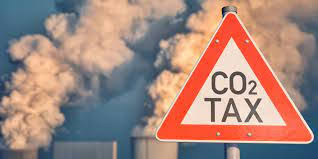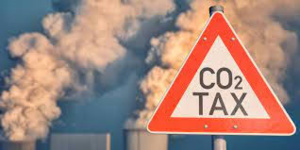The Asian Development Bank (ADB) stated in a research released on Monday that while a European Union plan to put tariffs on high-carbon imports may harm emerging Asian nations, it is unlikely to result in significant reductions in greenhouse gas emissions.
Concerns that a sizable portion of the EU supply chain was now beyond the purview of the emissions trading scheme (ETS) due to manufacturing outsourcing led to the introduction of the Carbon Border Adjustment Mechanism (CBAM).
It was intended to create parity in the market by requiring foreign suppliers, even those exempt from domestic carbon taxes or ETSs, to pay the same price for carbon as domestic ones.
According to ADB, CBAM was predicted to reduce Asian exports to the EU, especially from western and southwestern Asia, while steel imports from India were also anticipated to suffer.
However, it stated that methods to share emission reduction technology would be more successful because any slight reduction in emissions would be soon offset by the ongoing rise in carbon-intensive activity throughout Asia.
"It's actually a relatively limited policy at the moment," said Neil Foster-McGregor, ADB's senior economist. "It only imports into the EU (and) only covers six sectors.
"The way the scale of production is increasing, even if we do this carbon pricing more broadly across the globe, you're still going to see rising emissions unless we see a fundamental change in production techniques," he added.
Foster-McGregor estimated that CBAM might generate about 14 billion euros ($15.2 billion) in revenue by 2030. The money made from this initiative should go towards financing poor nations' efforts to decarbonise their industrial sectors.
One of the objectives of CBAM was to encourage non-EU economies to implement more stringent climate policies of their own; exporting countries will have their CBAM charge lowered if they can show that a carbon price has already been paid.
Export tariffs on CBAM-covered goods sold to Europe have previously been proposed by India, and China is extending its ETS to include exporting industries like steel. Both nations have expressed disapproval of CBAM, with China cautioning Europe against using climate change as a justification for trade protectionism.
(Source:www.usnews.com)
Concerns that a sizable portion of the EU supply chain was now beyond the purview of the emissions trading scheme (ETS) due to manufacturing outsourcing led to the introduction of the Carbon Border Adjustment Mechanism (CBAM).
It was intended to create parity in the market by requiring foreign suppliers, even those exempt from domestic carbon taxes or ETSs, to pay the same price for carbon as domestic ones.
According to ADB, CBAM was predicted to reduce Asian exports to the EU, especially from western and southwestern Asia, while steel imports from India were also anticipated to suffer.
However, it stated that methods to share emission reduction technology would be more successful because any slight reduction in emissions would be soon offset by the ongoing rise in carbon-intensive activity throughout Asia.
"It's actually a relatively limited policy at the moment," said Neil Foster-McGregor, ADB's senior economist. "It only imports into the EU (and) only covers six sectors.
"The way the scale of production is increasing, even if we do this carbon pricing more broadly across the globe, you're still going to see rising emissions unless we see a fundamental change in production techniques," he added.
Foster-McGregor estimated that CBAM might generate about 14 billion euros ($15.2 billion) in revenue by 2030. The money made from this initiative should go towards financing poor nations' efforts to decarbonise their industrial sectors.
One of the objectives of CBAM was to encourage non-EU economies to implement more stringent climate policies of their own; exporting countries will have their CBAM charge lowered if they can show that a carbon price has already been paid.
Export tariffs on CBAM-covered goods sold to Europe have previously been proposed by India, and China is extending its ETS to include exporting industries like steel. Both nations have expressed disapproval of CBAM, with China cautioning Europe against using climate change as a justification for trade protectionism.
(Source:www.usnews.com)






